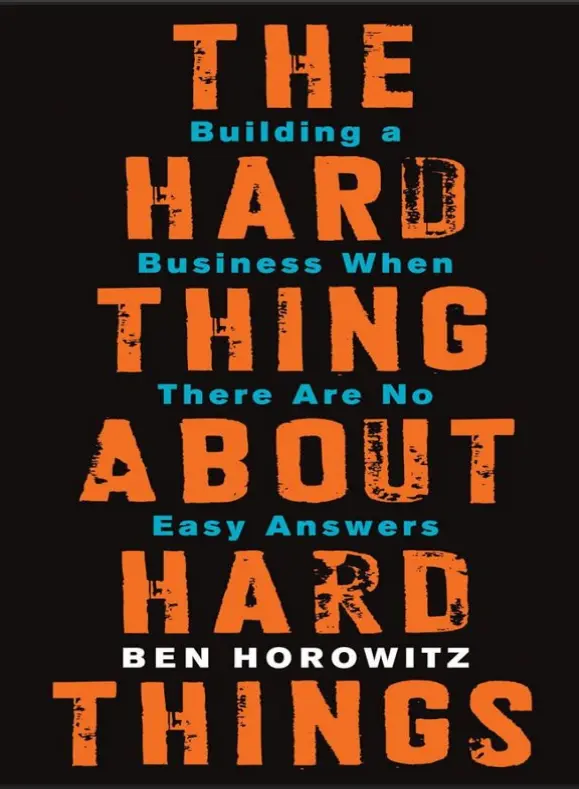
The Hard Thing About Hard Things offers raw, real-world advice for entrepreneurs and CEOs. Ben Horowitz shares battle-tested wisdom on handling layoffs, firing friends, leading through crisis, and building company culture. This isn’t a feel-good guide—it’s a gritty, honest look at the toughest parts of running a business, and how to survive and thrive when there are no easy answers.
The Hard Thing About Hard Things is a brutally honest and deeply practical guide to what it really takes to build and run a company , especially during the most difficult times.
Written by Ben Horowitz , co-founder of Andreessen Horowitz and former CEO of Opsware (formerly Loudcloud), this book doesn’t offer feel-good platitudes or simplistic formulas for success. Instead, it dives into the real, messy, painful decisions that leaders face—from firing friends, to surviving financial crises, to managing company culture during rapid growth.
Horowitz’s message is clear:
There are no easy answers in leadership—but there are better ways to think about hard problems.
Unlike many business books that focus on strategy or marketing, this one focuses on execution under pressure —the kind of situations where most CEOs fail.
One of the central themes of the book is that being a CEO is incredibly hard—and often lonely .
Horowitz challenges the glamorous image of entrepreneurship. He explains that while startups may look exciting from the outside, the day-to-day reality involves:
“The difference between CEO and everyone else is that the CEO is responsible for everything in the company.”
This means being the final decision-maker when there are no good options—and taking responsibility even when things go wrong.
Key Insight: Great CEOs aren’t defined by how well they handle good times—they’re defined by how they lead through the worst.
Horowitz shares several personal stories that illustrate how he handled some of the hardest moments in his career:
As companies grow or struggle, founders sometimes have to let go of early team members—even close friends—who are no longer the right fit. It’s emotionally painful but often necessary for the company’s survival.
During tough economic periods or funding droughts, cutting staff is often unavoidable. Horowitz emphasizes doing it with dignity, honesty, and empathy—even when it feels brutal.
Sometimes you’re forced to choose between two terrible paths. Horowitz teaches that in those moments, clarity of purpose and long-term vision should guide your choice—even if it’s unpopular.
Important Lesson: Leadership isn’t about being liked—it’s about making the best possible decision, even when it hurts.
One of the most insightful chapters deals with company culture . Horowitz argues that culture is not just HR slogans or office perks—it’s the set of behaviors and values that define how people work together .
He gives practical advice on how to build a strong culture:
“Your culture is how your company makes decisions when you’re not there to make them yourself.”
Key Insight: Culture isn’t something you create once—it must be maintained daily through actions, not words.
Many entrepreneurs start out as engineers, designers, or salespeople—but eventually, they must become managers and leaders . Horowitz provides a rare, hands-on perspective on what effective management looks like.
He offers concrete guidance on:
One of his most famous frameworks is “The Good Product Manager/Bad Product Manager” list , which clearly defines what excellence looks like in key roles.
Important Lesson: Great management is not about control—it’s about enabling others to do their best work.
Horowitz introduces the concept of “The Struggle” —a state every entrepreneur experiences where everything seems to be going wrong. You’re exhausted, overwhelmed, and unsure if your company will survive.
But he insists:
“The Struggle is where greatness is forged.”
Instead of avoiding it, you must learn to embrace it and push through.
Key Insight: If you can endure The Struggle mentally and emotionally, you’ll come out stronger than ever.
While many startup books focus on product-market fit or scaling, Horowitz reminds us that building a great company requires much more than building a great product .
He discusses:
“If you don’t love the company-building process, you won’t last long enough to enjoy the rewards.”
Important Lesson: Founders must be missionaries, not mercenaries—driven by purpose, not just profit.
Horowitz offers a treasure trove of advice for first-time CEOs, including:
He also warns against common pitfalls like:
Key Insight: The CEO’s job is never done—but it’s always evolving.
Throughout the book, Horowitz draws from his own experience leading Loudcloud through the dot-com crash, selling it to HP, and rebuilding it into Opsware, which was later acquired by Hewlett-Packard for $1.6 billion.
He also shares lessons learned from working with top tech leaders like:
These real-life case studies bring theory to life and show how principles apply in actual high-stakes scenarios.
The Hard Thing About Hard Things doesn’t pretend to have all the answers. But it gives readers a mindset and framework for dealing with the unknown —which is where most of business happens.
It’s a must-read for anyone who wants to understand:
As Horowitz writes:
“In the end, being a CEO is simply being human—just at a higher intensity.”